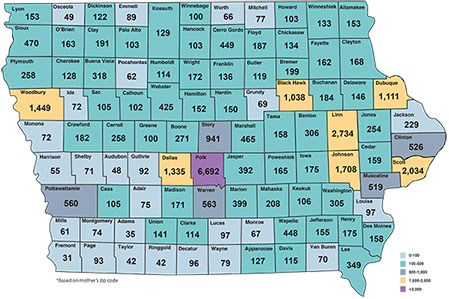Newborn Screening Program seeks public input

Participants will take part in discussions and presentations to help them learn the basics of newborn screening and the goal to identify babies who may have potentially life-threatening conditions in a timely manner so medical treatment can be provided promptly.
Currently, Iowa screens for more than 49 conditions that cause symptoms in newborns. IDPH will use participants’ recommendations to help assess how best to add screening for three conditions to Iowa’s newborn screening program: MPS-1 (Mucopolysaccharidosis Type I); X-ALD (X-Linked Adrenoleukodystrophy); and Pompe disease.
For these conditions, only a small percentage of cases show symptoms in the first year of life. No test or screen is available to determine if symptoms will begin during the newborn period, early childhood, adolescence or adulthood. This makes it difficult to determine when treatment should be started for the best outcome, and can present a hardship to the family.
“Public opinion is crucial for IDPH to determine if Iowa residents see value in screening for the new disorders,” said Travis Henry, SHL assistant research scientist who works with the Iowa Newborn Screening Program.
Because screening is provided for all babies born in Iowa, the state requires that the program show how screening is beneficial and provides a significant improvement in a patient’s medical condition. This Community Engagement Event is designed to gather some of this information.
“For the new disorders, there is a question about the certainty of benefit, and so the state needs to gather public input on the benefit of screening for these particular conditions,” said Henry.
Funding for collecting public input and incorporating it into the decision-making process is provided by a grant from the Association of Public Health Laboratories and the Colorado College of Public Health joint NewSTEPs program.
IDPH and the Center for Congenital and Inherited Disorders administers the Iowa Newborn Screening Program. SHL conducts screening 365 days of the year and the University of Iowa Stead Family Children’s Hospital and Department of Pediatrics provides clinical follow-up services.



